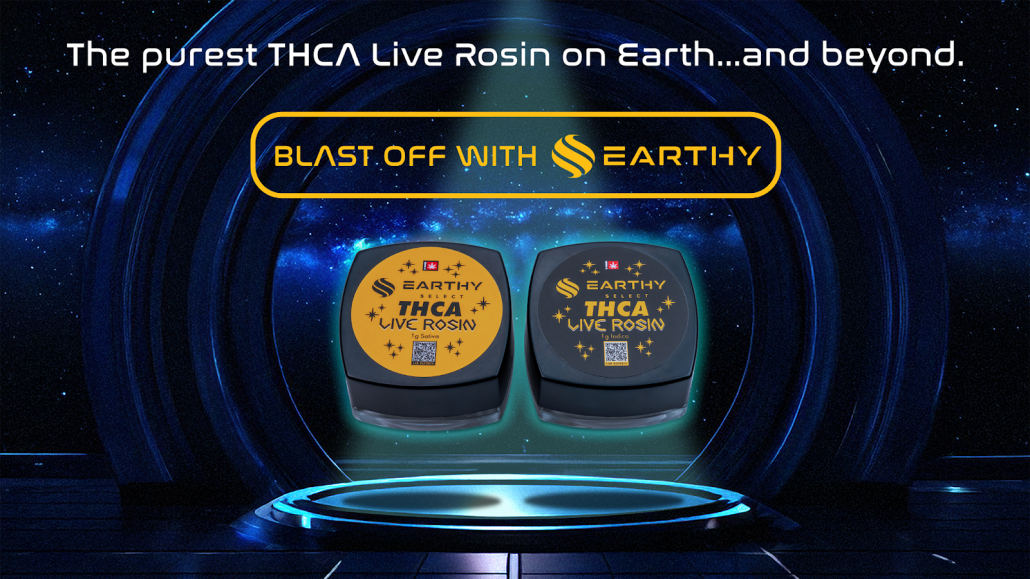Is THCa Safe to Smoke? What the Science and Stoners Say
As the cannabis industry grows, so does curiosity around its components—particularly THCa. THCa, or Tetrahydrocannabinolic acid, stands out as the non-intoxicating forerunner to THC, sparking interest for its potential benefits. Enter Earthy Select, leading the charge with federally compliant THCa flower that promises a safe and potent experience, sourced from top-tier family farms and facilities in California and Colorado.
But questions linger: Is smoking THCa truly safe? Of course, smoking anything comes with certain risks; however, THCa’s unique properties—as a precursor to THC activated by heat—put it in an unexplored category. Addressing concerns, Earthy Select prioritizes consumer safety, utilizing DEA-registered and ISO-accredited labs to ensure pure, high-quality products. While anecdotes from the cannabis community abound, we still await consensus from comprehensive studies. Join us as we sift through the available evidence, weighing in on the debate and striving for clarity on whether THCa represents a cleaner way to enjoy cannabis or a step into unknown territory.
What Happens When You Smoke THCa?
Smoking THCa initiates a chemical process directly within the material being consumed. As the non-psychoactive precursor to THC, THCa remains inactive until exposed to heat, which triggers a reaction known as decarboxylation. This process converts THCa into THC, the compound associated with psychoactive effects [1].
Chemically speaking, when heat is applied, such as through a flame, THCa undergoes a transformation by losing a carboxyl group, resulting in THC. It’s worth noting that not all THCa may convert to THC, depending on factors like temperature and duration of heat exposure. Once formed, THC interacts with cannabinoid receptors in the brain, potentially leading to effects such as euphoria or increased appetite [1].
While inhalation allows for rapid onset of effects, it also involves exposure to other plant materials and combustion byproducts. Though cannabis smoke is often regarded as less harmful than tobacco smoke, it still contains irritants and possible toxins. Notably, the long-term implications of smoking THCa on respiratory health are still under investigation, leaving some uncertainty with each use [2].
THCa Converts to Delta-9 THC with Heat
Have you ever considered why raw THCa doesn’t produce psychoactive effects? The answer lies in a process called decarboxylation. THCa, the non-psychoactive compound present in unheated cannabis, transforms into Delta-9 THC, the psychoactive component, when exposed to heat. This conversion typically occurs at temperatures between 220-240°F (104-116°C) during smoking or vaporizing [1].
However, the temperature must be carefully managed, as excessive heat may degrade THC into CBN, a compound associated with more sedative effects. Additionally, smoking introduces health considerations due to the inhalation of combustion byproducts. Alternatives like vaping or dabbing may potentially reduce exposure to some harmful substances while still facilitating the desired effects [3]. Ultimately, heat is essential for unlocking the psychoactive potential of cannabis, and the method of application can influence the overall experience.
Why People Choose to Smoke THCa Flower
THCa flower often appeals to those who are mindful of cannabis legality and its chemical properties. As a non-intoxicating compound in its raw form, THCa becomes psychoactive only when heated, which may position it within certain legal frameworks, particularly in areas where traditional marijuana is not permitted under federal or state regulations [4].
In addition to legal considerations, THCa Flower is often valued for its perceived purity and potency. Some users report a smoother experience with less anxiety compared to other THC products, though such observations are largely anecdotal and await further scientific validation. The appeal is also tied to the ritual of smoking itself, with many appreciating the hands-on process of preparing and consuming the flower, a practice deeply rooted in cannabis culture. Furthermore, the growing availability of lab-tested products reflects a consumer preference for transparency and safety in their choices.
Rapid Onset Relief
One of the primary reasons for smoking THCa is the speed of its effects. In other words, when inhaled, cannabinoids are absorbed into the bloodstream almost immediately, often producing noticeable effects within 2-10 minutes. In contrast, edibles may take up to 90 minutes to manifest [5]. This quick action can be particularly valuable for individuals seeking prompt relief from discomfort or stress.
Beyond speed, smoking allows for real-time control over dosing. A single inhalation can provide feedback within minutes, enabling users to adjust intake accordingly and potentially avoid overconsumption, a concern sometimes associated with edibles. However, it’s important to consider the potential respiratory irritants involved in smoking, which may pose health trade-offs despite the benefit of rapid relief [2].
Predictable and Potent Effects
THCa flower may offer a level of consistency that can be challenging to achieve in less regulated markets. With lab-verified cannabinoid content often ranging from 20-30%, users might experience more reliable effects, whether seeking a subtle lift or a deeper relaxation. This predictability is tied to the decarboxylation process, where THCa converts to THC upon heating [1]. When sourced from reputable providers, the variability in intensity may be reduced.
Some users describe the effects of federally compliant THCa as smoother compared to unregulated products, though this is based on personal accounts rather than conclusive evidence. There may be less unpredictability in the experience, potentially leading to a more controlled sense of relaxation or euphoria. Whether aiming for a mild daytime effect or a more immersive escape, high-quality THCa flower, when backed by strict quality controls, could offer a tailored experience.
Full-Spectrum Cannabinoid Experience
Exploring the complexity of cannabis reveals the concept of the ‘entourage effect’—a potential synergy among cannabinoids, terpenes, and flavonoids. This interaction extends beyond THC alone, with compounds like CBD and aromatic terpenes contributing to a more layered experience. Preliminary research suggests that a full-spectrum approach might provide a different effect compared to isolated compounds, though more definitive studies are needed [6]. THCa flower, for instance, is often appreciated not only for the THC it becomes but for the comprehensive encounter it may offer to enthusiasts.
Crafted for Clarity (or Creativity, or Calm)
THCa flower is often developed with a focus on precision, aiming to align each use with specific desired outcomes, such as focus, creativity, or relaxation. Indeed, cultivation techniques have advanced to refine cannabinoid profiles, seeking to ensure a consistent effect with each session.
Many vendors prioritize purity, often testing THCa buds through accredited labs to minimize the presence of unwanted chemicals. Organic farming practices are sometimes emphasized to support this goal. When sourced from trusted providers, users may feel more confident in the consistency and quality of their experience, selecting products that match their intended mental state, whether mild for productivity or stronger for deeper relaxation.
Potential Wellness Perks (with a Quick Note)
It’s important to clarify that THCa, in its raw, non-psychoactive form, differs from THC. Some early research, including a 2013 study published in the British Journal of Pharmacology, suggests that THCa might have anti-inflammatory or neuroprotective properties [7]. However, much of this data comes from preclinical studies, such as those involving animals or in vitro models. Human trials are still limited, leaving many questions unanswered.
Anecdotal reports often highlight THCa for its potential to promote calmness or ease discomfort, though these personal experiences lack robust scientific support. Due to historical regulatory constraints, cannabis research remains in its early stages, and many claims about THCa’s benefits await further exploration through comprehensive studies.
Quick Note: It’s worth noting that smoking THCa, or any substance, may carry risks to respiratory health due to combustion byproducts [2]. For those prioritizing wellness, non-inhalation methods such as edibles or tinctures might be considered as alternatives. Safety considerations will be discussed further, but it’s prudent to weigh the potential benefits against the risks of different consumption methods from the outset.
How Does Smoking Compare to Vaping THCa?
When evaluating smoking versus vaping THCa, personal preference and health considerations both play significant roles. For example, smoking involves combustion to convert THCa into THC, delivering immediate effects but potentially introducing respiratory risks from byproducts such as tar and carcinogens [2].
Vaping, on the other hand, heats THCa without burning it, which may reduce exposure to certain toxic byproducts, as indicated by studies comparing vaping to smoking cannabis [3]. Vaping could also be more efficient, requiring less product for a similar effect, though smoking retains a dedicated following for its direct and robust impact. Ultimately, the choice between the traditional experience of smoking and the potentially less harmful approach of vaping depends on individual priorities regarding health and potency, with an emphasis on ensuring the quality and safety of vaping products to avoid additional risks [8].
Risks to Know Before You Spark Up
The growing interest in smoking THCa is undeniable, yet it’s essential to consider potential risks before use. While THCa in its raw form is non-intoxicating, the act of smoking can release harmful substances like tar and possible carcinogens, which may pose threats to lung health [2]. Additionally, heating THCa converts it into THC, which introduces not only health considerations but also potential legal complexities. Although THCa derived from hemp with less than 0.3% Delta-9 THC may be federally permissible under the 2018 Farm Bill, its transformation into THC could raise legal concerns depending on local regulations [4].
Quality assurance is another factor to consider; without rigorous testing, there’s a risk of exposure to contaminants like pesticides, mold, or heavy metals through inhalation [9]. The long-term effects of smoking THCa specifically remain largely unexplored due to limited research. While some preliminary studies suggest potential benefits, the absence of extensive human data means uncertainties persist. In summary, the decision to smoke THCa should be approached with careful consideration of both health and legal implications.
Combustion Byproducts Go Beyond THCA
Consuming THCa flower involves more than just the effects of cannabinoids. Each inhalation includes a range of byproducts beyond the intended compounds. Combustion generates substances such as tar and carbon monoxide, along with other elements that could place stress on the respiratory system [2].
Research indicates that burning any material, including cannabis, produces polycyclic aromatic hydrocarbons (PAHs), which are associated with potential health risks [10]. The heat applied during smoking often exceeds the optimal range for converting THCa to THC, which might result in inhaling additional harmful byproducts. While smoking THCa is not universally deemed hazardous, it is also not considered entirely without risk. The complete impact of THCa smoke on health is still being studied, so users should remain aware that there are aspects yet to be fully understood.
High Potency Can Hit Hard
Often ranging from 20-30% cannabinoid content, THCa flower can produce significant effects. It’s important to understand that when heated, THCa converts to THC, which may result in intense relaxation or heightened mental activity. Research suggests that high-potency cannabis might increase the likelihood of adverse mental health effects, such as anxiety or, in rare cases, psychosis, particularly among less experienced users [10].
While seasoned users may seek out these potent strains for their sustained effects, those new to cannabis might find the intensity challenging. Community discussions often emphasize caution, with advice to start with smaller amounts and proceed gradually. The strength of THCa flower serves as a reminder that preparation and mindfulness are key when considering its use.
Pesticides, Heavy Metals, and Purity Concerns
Beyond the effects of THCa, concerns about purity are significant when smoking flower. Cannabis plants can absorb contaminants like pesticides and heavy metals from their environment, which are undesirable when inhaled. Studies highlight the potential health risks associated with such exposures, particularly through inhalation [9]. Smoking does not eliminate these contaminants, which could lead to intake at levels exceeding safe thresholds.
Additionally, risks such as mold and bacteria may be present due to inadequate curing or storage practices, posing further health considerations [11]. A practical approach is to seek products with third-party testing. Reputable sources typically provide lab results to confirm safety. Sourcing THCa flower from unverified suppliers could introduce unnecessary risks, so reviewing lab documentation is a prudent step to ensure a safer experience.
The Law Isn’t Always Crystal Clear
Understanding the legal status of THCa can be complex. As of the 2018 Farm Bill, hemp is categorized as cannabis containing 0.3% Delta-9 THC or less, which may suggest that hemp-derived THCa is federally permissible. However, when heated, THCa transforms into Delta-9 THC, potentially crossing into the realm of a controlled substance if it exceeds the legal threshold [4]. This distinction creates a nuanced situation where raw THCa might be considered legal, but its converted form may not be.
State-level regulations add further complexity, with some jurisdictions explicitly restricting THCa or any compound that converts to Delta-9 THC, while others have ambiguous policies. Enforcement varies widely, leaving both businesses and consumers navigating a shifting landscape. As a result, the legal framework surrounding THCa remains intricate, and users should be mindful of local laws to avoid potential complications.
Finding the Right THCa Strain for Your Vibe
Selecting an appropriate THCa strain is a personal process. When heated, THCa converts to THC, producing effects influenced by the strain’s cannabinoid and terpene composition. For example, terpenes such as myrcene or limonene may contribute to whether the experience feels calming or energizing, though individual responses can differ [6].
The general classification of indica, sativa, and hybrid strains offers a starting point: indicas are often associated with relaxation, sativas with stimulation, and hybrids with a blend of both. However, personal reactions vary, so these categories should be viewed as guidelines rather than definitive predictors.
When choosing a strain, consider your experience level and desired effect. Those new to cannabis might opt for milder options, while experienced users could explore stronger profiles. Input from knowledgeable sources, community feedback, and personal experimentation can be valuable. Ultimately, keeping track of preferences may help identify the strain that best aligns with your needs.
Sativa THCa Strains
Sativa THCa strains are often associated with an uplifting or mentally stimulating experience, appealing to those seeking a creative or focused effect. Typically, these strains contain high levels of THCa, which converts to THC when heated, potentially delivering an energizing impact.
Given their potency, with concentrations sometimes reaching up to 30%, a cautious approach is advisable. Keep in mind that research indicates excessive use of high-potency products might lead to discomfort or anxiety in some individuals [12]. Within the cannabis community, suggestions often include using lower temperatures for dabbing or vaping to potentially minimize respiratory risks while still accessing the strain’s effects.
Indica THCa Strains
Indica strains are frequently chosen for their potential to provide help to individuals seeking relaxation and support sleep. This is sometimes attributed to terpenes like myrcene, which may have sedative qualities and enhance the impact of THCa when converted to THC. Effects can vary, so starting with smaller amounts is often recommended, especially for those less familiar with cannabis [12].
From a health perspective, smoking indicas carries similar considerations as other strains, with combustion introducing byproducts like tar and carcinogens [2]. Using a vaporizer might lessen some of these risks, though further research is needed [3]. Regardless of strain type, the act of smoking impacts respiratory health, and the potency of indicas means effects could be more pronounced. Checking lab reports for cannabinoid content is a practical step to understand what to expect.
Hybrid THCa Strains
Hybrid cannabis strains are often appreciated for their potential to combine elements of relaxation and stimulation, drawing from both indica and sativa characteristics. Safety is more closely tied to cultivation and testing practices than to the hybrid designation itself.
Discussions around hybrids vary, with some users valuing the balanced effects while others note variability in predictability. Terpenes, the aromatic compounds in cannabis, may influence the overall experience [6].
Final Thoughts
Navigating the safety of THCa can seem daunting, but with ongoing research, we’re gaining more clarity. Generally, smoking THCa appears as safe as smoking marijuana, as it transforms into THC upon heating. However, we must still consider contaminants, carcinogens, and the potential harm associated with any type of smoking.
At Earthy Select, we prioritize your peace of mind. That’s why our THCa Flower is rigorously tested for safety and consistent potency. We adhere to federal standards to deliver top-notch cannabis products. Choose your path with Earthy Select—experience the finest, safest, and most reliable THCa options available.
Frequently Asked Questions About Smoking THCa
What effects do people typically feel from smoking THCa?
When THCa flower is smoked, it converts to THC, potentially producing effects that vary from relaxation and euphoria to enhanced focus, depending on the strain and individual response. Earthy Select provides a range of strains to align with different preferences, with cannabinoid content reaching up to 30% for a potent experience.
How does the body process THCa when it’s smoked?
Smoking transforms THCa into THC through heat, facilitating a rapid effect as it interacts with brain receptors. This method offers a quicker onset compared to edibles due to absorption through the lungs [5]. Earthy Select ensures product purity through extensive testing for a quality smoking experience.
Can THCa help with specific medical needs?
While raw, non-psychoactive THCa may show potential benefits like neuroprotective support, smoking converts it to THC, which has been more extensively studied for effects [7]. Evidence specific to THCa remains limited, and professional medical guidance is recommended for health-related inquiries. Earthy Select’s products meet high safety standards but are not intended as medical treatments.
Is smoking THCa more effective than other consumption methods?
The perceived effectiveness of smoking THCa varies by individual preference. Smoking offers a rapid onset, while alternatives like edibles or tinctures differ in absorption time and duration [5]. Earthy Select aims to provide consistent and potent THCa across various consumption methods.
Are there any studies discussing the long-term effects of smoking THCa?
Research on the long-term effects of smoking THCa specifically is scarce due to historical regulatory constraints on cannabis studies. Available data suggests that risks may be similar to those of smoking THC, particularly concerning lung health due to combustion byproducts [2]. Earthy Select sources organically grown flower and conducts rigorous testing to support consumer confidence.
Do different strains produce varying levels of THCa?
Yes, THCa content can differ across strains due to genetic variations and cultivation practices. Earthy Select offers a selection of strains with diverse cannabinoid profiles, catering to preferences ranging from uplifting to relaxing effects.
How does decarboxylation affect THCa when smoking?
Smoking facilitates the decarboxylation of THCa into THC, triggering psychoactive effects. Earthy Select’s flower is designed to support efficient conversion, aiming for consistent potency during use [1].
How should I store cannabis to preserve THCa content?
To maintain THCa levels, store cannabis in a cool, dark environment, protected from heat, light, and air, using an airtight container. Properly stored, Earthy Select’s THCa Flower is designed to retain its quality for future use.
Medical Disclaimer / Legal Disclaimer – Information is provided for educational purposes only. It does not, and is not intended to, constitute legal advice or medical advice. We strive to be accurate and up-to-date, but the legality of cannabinoids and the science of cannabis are continually evolving. The author is neither a legal professional nor a medical expert. Before buying or using any products, you should consult with your local authorities and medical providers.
References:
- https://www.3chi.com/blog/decarboxylation-why-heat-matters-when-using-thca-flower/
- https://ocrevive.com/is-thca-safe-facts-every-consumer-should-know/#:~:text=Smoking%20THCA%20flower%20can%20pose,adverse%20effects%20associated%20with%20smoking
- Ghttps://recovered.org/marijuana/thca/thca-vape#:~:text=Understanding%20THCa%20vaping&text=This%20process%20converts%20THCa%20into,compared%20to%20traditional%20smoking%20methods
- https://indacloud.co/blogs/what-states-thca-illegal/
- https://highhippy.com/thca-onset-time/
- https://en.wikipedia.org/wiki/Entourage_effect
- https://delta8pharmagrade.com/thca-spray-the-future-of-cannabis-wellness/
- https://www.verywellhealth.com/are-vaporizers-the-safest-way-to-smoke-weed-1124089
- https://www.psu.edu/news/research/story/cannabis-may-contain-heavy-metals-and-affect-consumer-health-study-finds
- https://pmc.ncbi.nlm.nih.gov/articles/PMC7083135/
- https://www.edrosenthal.com/the-guru-of-ganja-blog/the-dangers-of-microbial-contaminants-in-cannabis-and-how-to-prevent-mold-and-mildew
- https://www.webmd.com/mental-health/addiction/marijuana-use-and-its-effects






